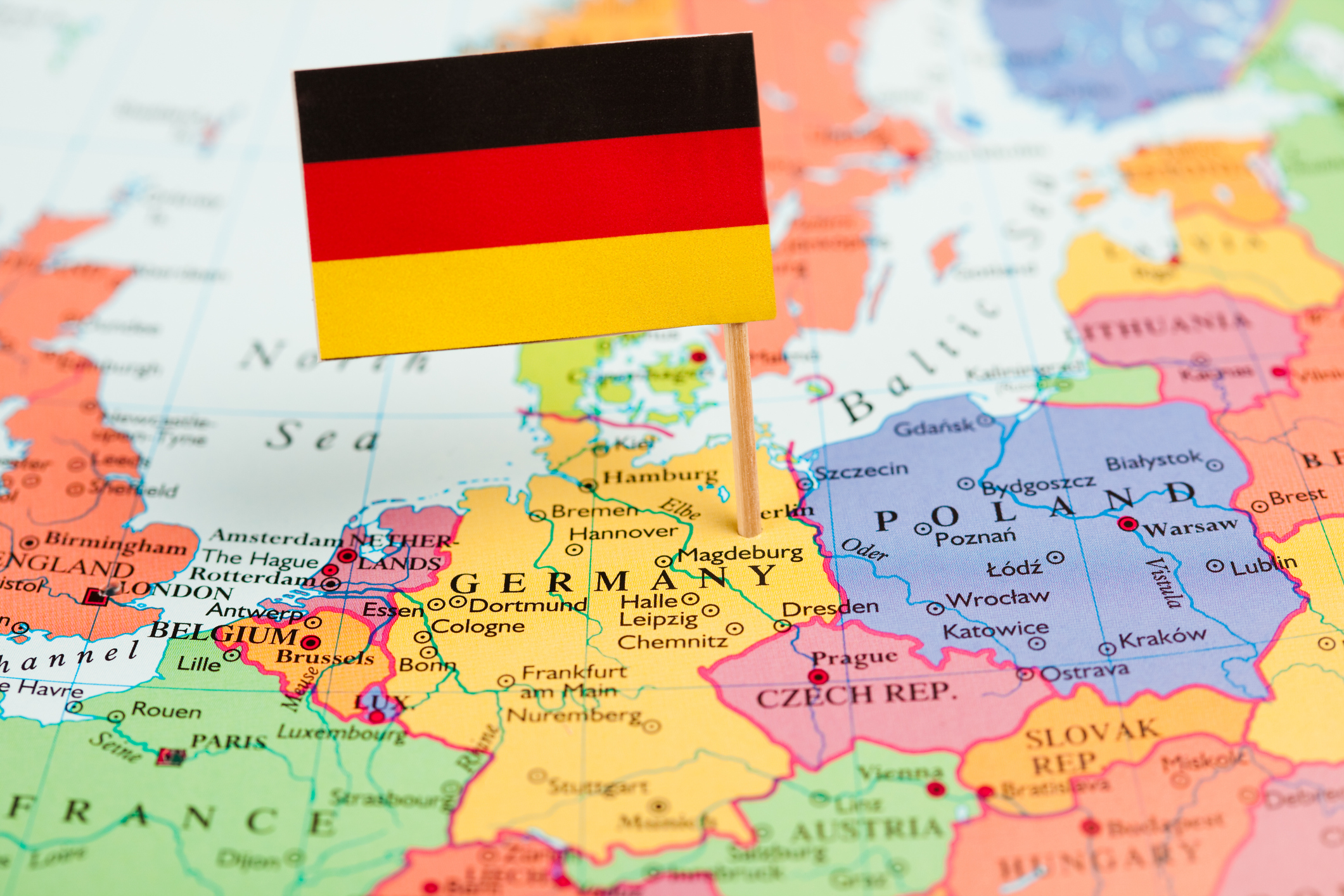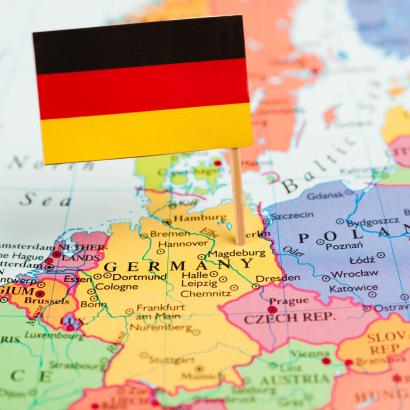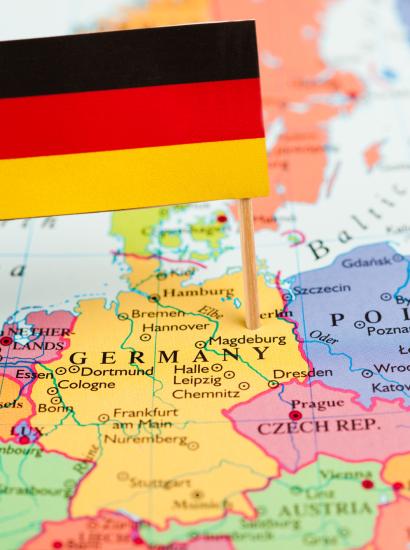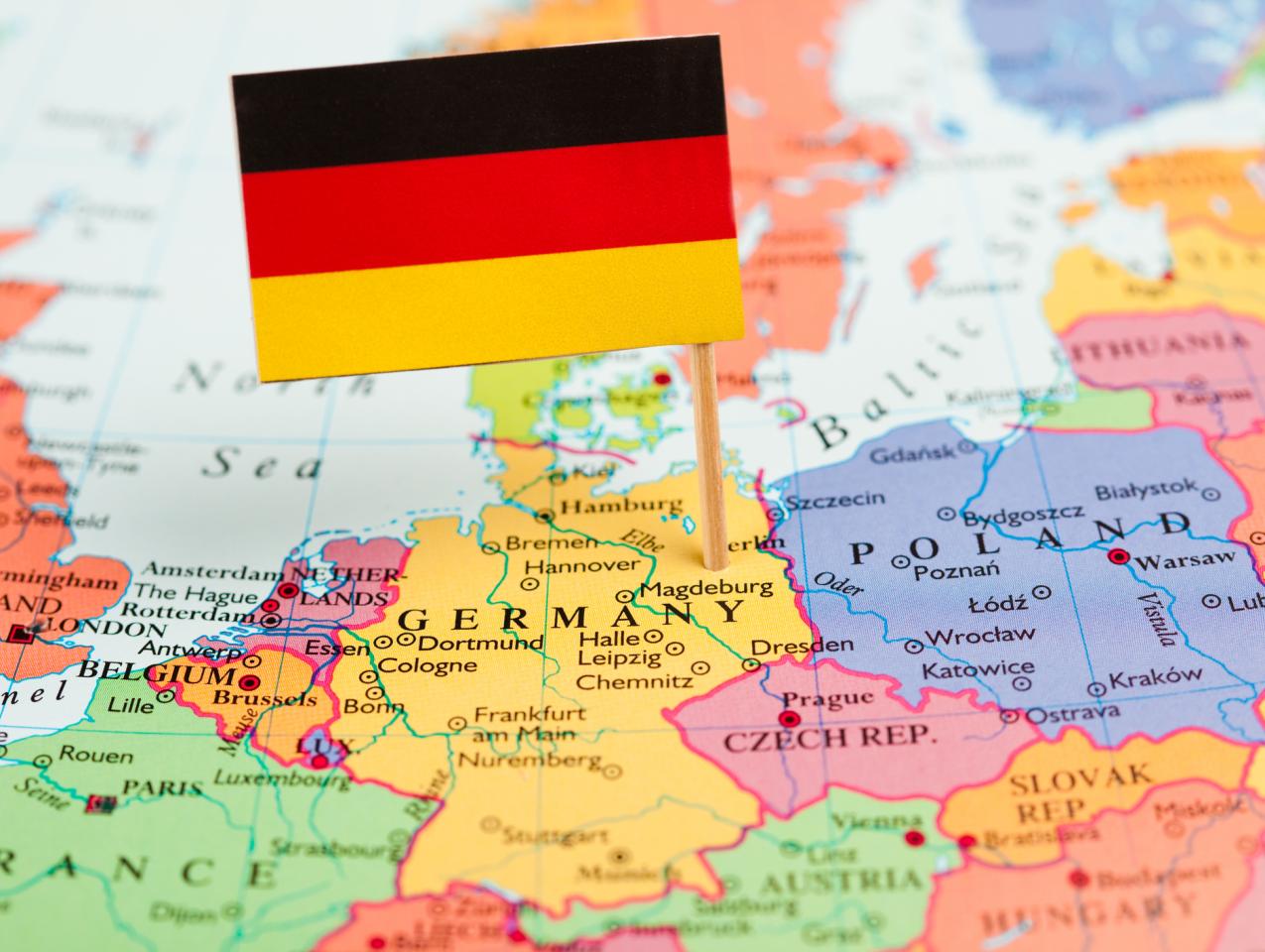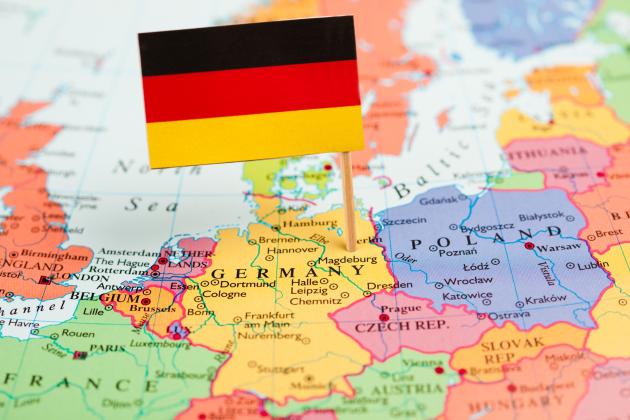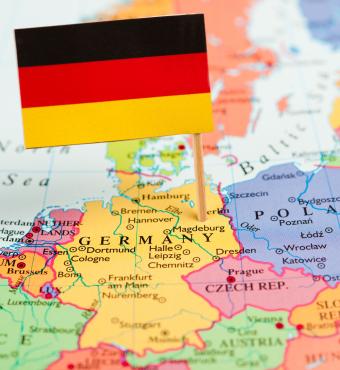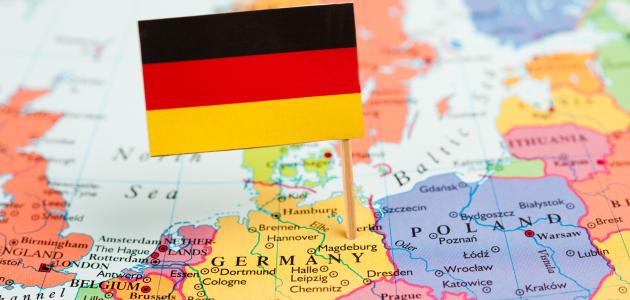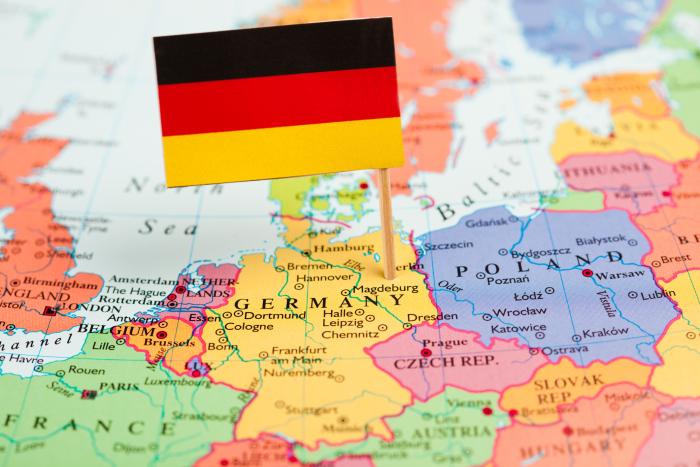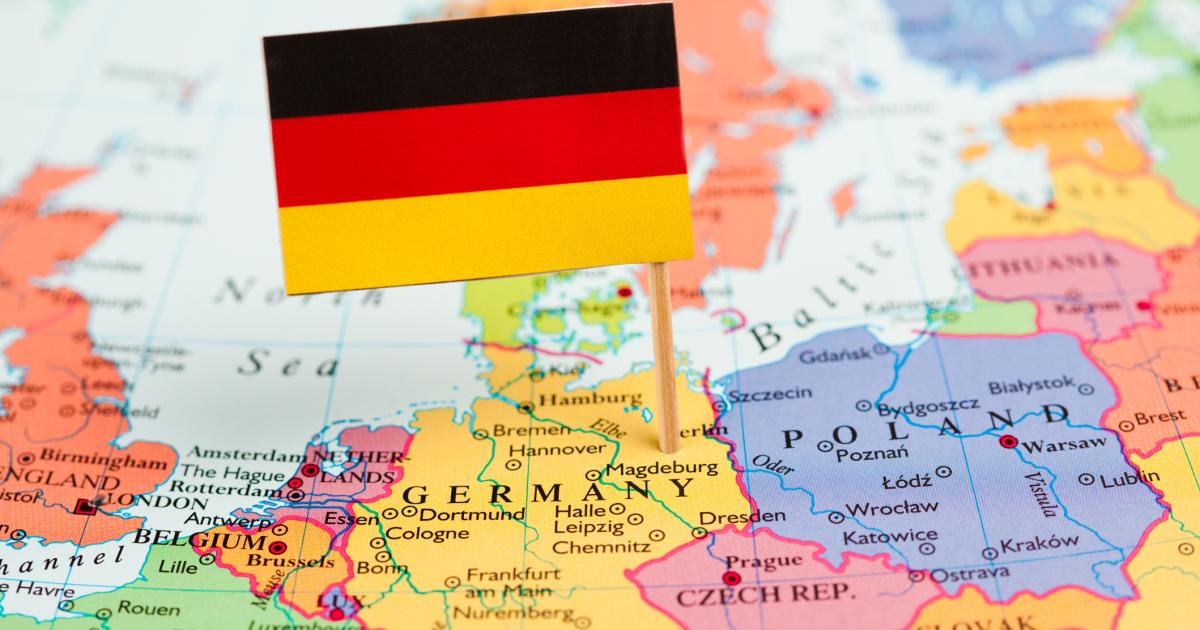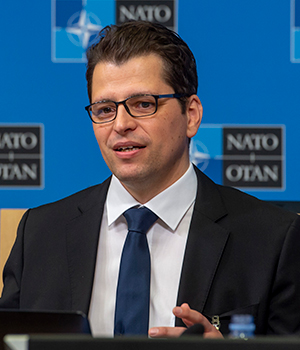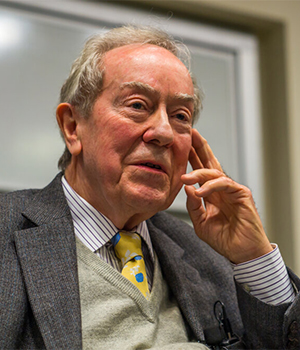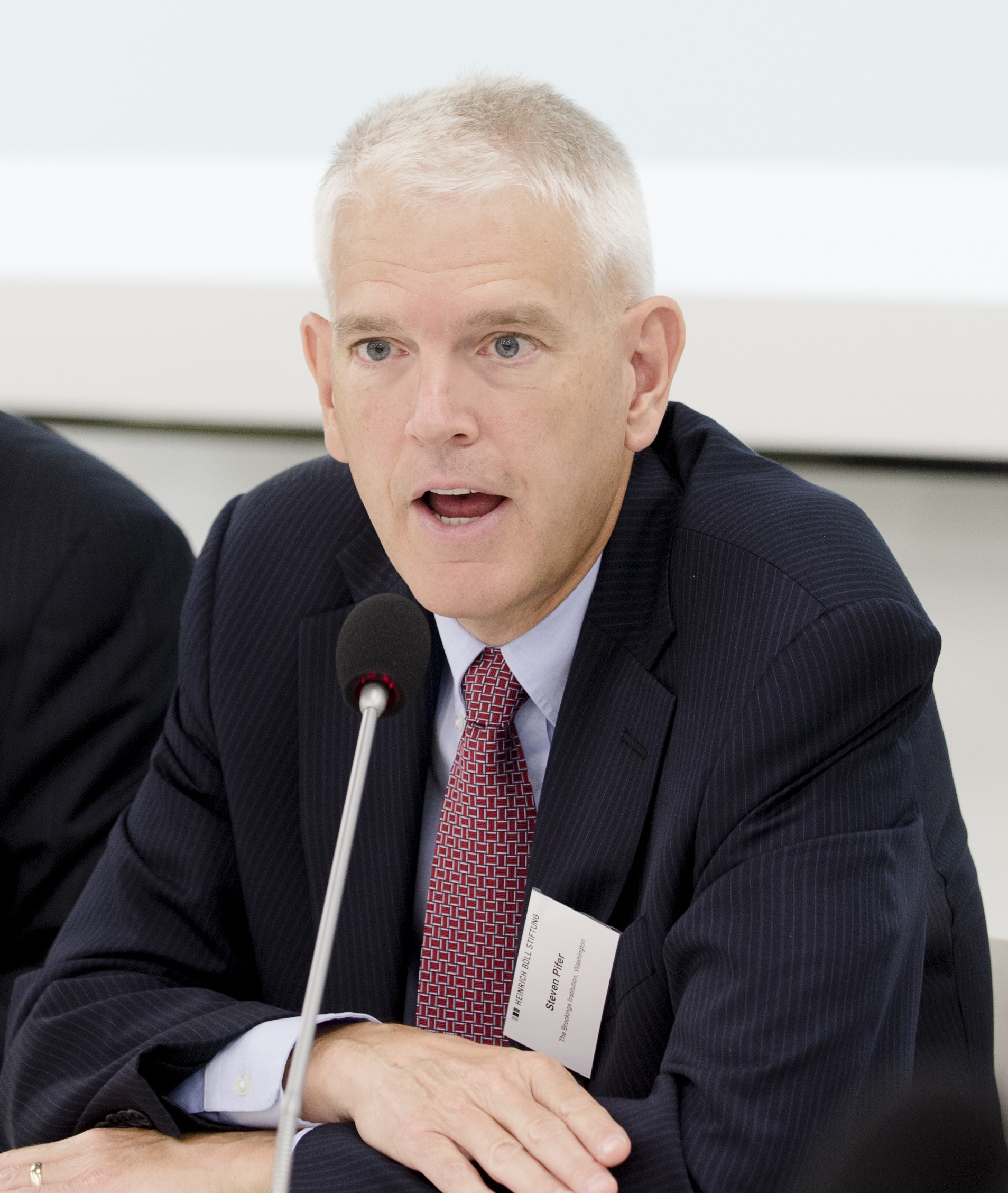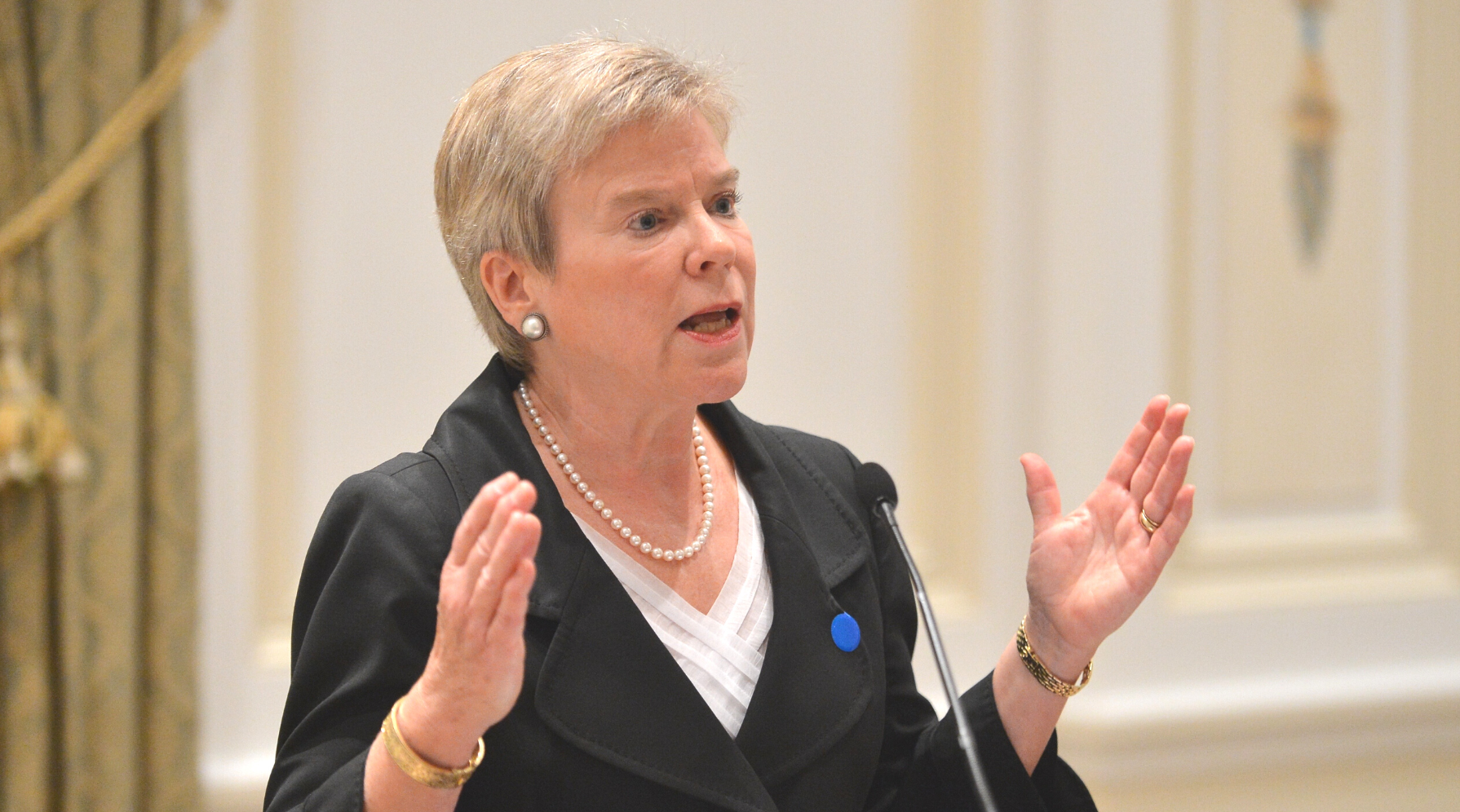

An Introduction by Ambassador Goodby, Ambassador Pifer, and Rose Gottemoeller
Former secretary of state George Shultz would often describe the collision of one’s ideas about the world with its actuality as being “mugged by reality.”
Coming to terms with the reality of an expansionist Vladimir Putin–led Russia that has openly abrogated the fundamental principles of the Helsinki Final Act has been challenging for many in the Euro-Atlantic community who thought that they shared a vision of a “Europe whole, free, and at peace”—an aspiration used to constructively encourage the unification of Germany and the enlargement of NATO membership, as well as one used to create a cooperative connection between NATO and Moscow through the NATO-Russia Founding Act. However, Dr. Stephan Kieninger, who presents his essay as part of the Hoover Institution and the American Academy of Arts and Sciences’ nuclear security dialogues, argues that Germany stands alone in struggling with the reality of that vision’s decisive rejection by a partner who no longer sees its values or interests as aligned with those of the Euro-Atlantic community.
Russia continues to wage a brutal and unprovoked war on Ukraine as Europe enters the winter of 2022–23. The dramatic changes of the past year require that Germany must think about what eventually replaces its failed strategy of economic integration with Russia as a path toward peace, and what that means for its diplomatic and security choices today. To that end, it is useful to consider the changes that German politics and security strategy were already undergoing before Russia’s full-scale invasion of Ukraine in February 2022, including questions about how it would meet its NATO responsibilities.
Following the September 26, 2021, Bundestag election, a new coalition comprising the Social Democratic Party, the Greens, and the Free Democratic Party was forming to take power in Germany. At a time when few in Germany perceived a specific new threat from Russia against Ukraine or elsewhere in Europe, the sharp political changeover had put a number of German security considerations on the table. Existing positions within that coalition conflicted with one another, and parties that had long espoused views from a position of opposition would now be responsible for their positions. Nuclear weapons policy was a major piece of that conflict, and among many other issues, the coalition needed to develop Berlin’s positions regarding nuclear sharing, the presence of US nuclear weapons in Germany, and the future of the German Air Force’s ability to maintain dual-capable aircraft and a nuclear delivery role. The coalition was also set to shape its positions regarding nuclear arms control, particularly in light of the desire in Germany that Russian nonstrategic nuclear weapons be brought into a future negotiation.
A joint nuclear security roundtable on these questions, convened in the fall of 2021 by the Hoover Institution and the American Academy of Arts and Sciences, included, among others, Steven Pifer, William J. Perry Fellow at Stanford’s Center for International Security and Cooperation (CISAC); and Rose Gottemoeller, of Stanford’s CISAC and the Hoover Institution. The discussion looked at the history of Germany’s security and nuclear weapons policies in particular.
The US military has long deployed nuclear arms in Germany (and other NATO members) under “programs of cooperation,” in which the weapons are maintained under US custody. With proper authorization, they could be turned over to be delivered by German pilots and aircraft, who would fly a NATO nuclear mission based on a decision by the alliance. In such a case, other NATO countries would undertake supporting missions, such as fighter escort. In other words, the mission would be an “all of NATO” one, not exclusive to Germany.
This practice is sometimes referred to as “nuclear sharing,” as it spreads the responsibility and risk for the nuclear element of NATO’s deterrence and defense posture among NATO members that do not have their own nuclear weapons. In the past, German governments have coupled their support for nuclear sharing with strong parallel support for arms-control efforts aimed at reducing the number and role of nuclear weapons, including nonstrategic nuclear arms in Europe.
Major post–Cold War drawdowns have left only US nuclear gravity bombs in Europe. In recent years, continuing this practice in Germany came into question as the German Air Force’s Tornado, the dual-capable aircraft designated for delivery of nuclear weapons, neared the end of its service life. A 2020 proposal to replace the Tornados with new dual-capable F/A-18s was blocked by the Social Democratic Party (Sozialdemokratische Partei Deutschlands, or SPD), the junior partner then in coalition with the Christian Democratic Union (CDU) / Christian Social Union (CSU).
With German Bundestag elections scheduled for September 2021, predictions that spring suggested the CDU/CSU as the likely winner and typically forecasted a CDU/CSU-Greens coalition, in which the CDU/CSU would ensure the continuation of Germany’s role in nuclear sharing. However, the elections produced an unexpected result. The SPD won the largest share of votes and formed a coalition with the Greens and the Free Democratic Party, which had placed third and fourth.
The coalition included only one unambiguously pronuclear party, the Free Democrats. The SPD seemed divided about nuclear arms and had trended to the left, while the Greens, who had moved toward the center in recent years, had begun in the 1980s as an antinuclear party. Coalition negotiations in the fall showed divisions over defense, nuclear sharing, and nuclear disarmament.
This raised questions in autumn 2021 about how the new government would handle nuclear sharing, arms control, and defense spending, particularly in the unusual situation of a coalition consisting of three rather than two parties. The new government would have to balance its ideas with the view of its NATO partners.
In late 2021, it was unclear if the new coalition would decide to approve a replacement for the Tornado, raising the prospect that the aging out of the Tornados might by default end Germany’s role in nuclear sharing (though the German security and defense bureaucracy appeared ready to push hard for sustaining the role). As for arms control, the coalition posed real questions about how Germany would approach the 2017 Treaty on the Prohibition of Nuclear Weapons (TPNW, which has not been joined by any nuclear-weapons or NATO state). Many in Germany argued for that nation to join as an observer, but the suggestion would find little enthusiasm among NATO allies. It was also unclear how the new government would handle the question of the NATO goal that each member spend at least 2 percent of its gross domestic product on defense and reach that target by 2024.
The December 2021 coalition agreement reaffirmed Germany’s general commitment to nuclear sharing but notably said nothing about the replacement of the Tornado. The agreement stated that Germany would participate as an observer at the conference of the countries party to the TPNW. It noted the importance of NATO but made no mention of the Alliance’s 2 percent goal, calling instead for a target of 3 percent of gross domestic product to be devoted to a combination of defense, diplomacy, and development.
Things changed dramatically following Russia’s invasion of Ukraine on February 24, 2022, which produced the biggest shock to German-Russian relations in three decades. Within a matter of weeks, the German government announced that it would immediately meet the 2 percent NATO defense and would provide defense spending with a one-hundred-billion-euro boost. It also announced its decision to procure dual-capable F-35 fighters to replace the Tornados and continue Germany’s role in nuclear sharing. Russia’s war against Ukraine produced policies that few would have predicted just a few short months before.
Now, fully a year past the 2021 Bundestag election and the new coalition’s assumption of power in Berlin, we turn to Dr. Stephan Kieninger for a German view of how Germany’s new leadership has navigated its need for a new security policy in a world that has changed so dramatically over the course of 2022.
Amb. James Goodby and Amb. Steven Pifer with Rose Gottemoeller
November 2022
* * *
Stumbling Forward
Russia’s war of annihilation in Ukraine is the most scorning act of terrorism in the twenty-first century.[1] The war has caused tectonic shifts in Germany’s foreign policy—it has turned on its head Germany’s long-standing policies in the realm of security, energy, and the economy. It has revealed the flaws of Germany’s traditional engagement policy toward Russia as well as its natural gas dependency—and it has shown the precarious state of Germany’s military after three decades of insufficient defense spending. Germany’s chancellor, Olaf Scholz, has started to correct the illusions of past policy.[2] However, Germany struggles to adjust to the new era.[3] Scholz is stumbling forward and has failed to become a true leader of Europe.[4] He is hesitant to underwrite Europe’s security with Germany’s economic and political power and is reluctant to take the lead in sending Ukraine the German tanks and infantry fighting vehicles it needs to recapture and defend more of its territory.[5]
All this reveals that policy makers in Berlin were not prepared for a return of geopolitics and the use of force in international relations. In Germany, there was a widespread notion that the end of the Cold War did indeed mark the end of history. The younger generation grew up with a romantic notion of international affairs. Germany made an enormous bet on the success of globalization, interdependence, and the sustainability of its “strategic partnership” with Russia. As Constanze Stelzenmüller reiterated, “It outsourced its security to the U.S., its exportled growth to China, and its energy needs to Russia. It is now finding itself excruciatingly vulnerable in an early 21st century characterized by great power competition and an increasing weaponization of interdependence by allies and adversaries alike.”[6] How can Germany become a more resilient country with a robust foreign policy and a clear national security strategy? How can Germany make a more meaningful contribution when it comes to the protection of the liberal order and Europe’s security?
The Search for a New Security Policy
Russia’s war in Ukraine has caused a fundamental turn in Germany’s foreign and defense policy.[7] Recently, Federal President Frank-Walter Steinmeier pointed out that “Russia’s brutal war of aggression in Ukraine has reduced the European security order to ashes. . . . It plunged us here in Germany, too, into a different time, into an uncertainty that we thought we had left behind us, a time marked by war, violence and displacement, by concerns that the war would spread across Europe like wildfire.”[8] In February 2022, Chancellor Scholz called this a Zeitenwende, or a historical turning point. Scholz has come a long way: On the eve of the war, his government offered Ukraine only five thousand helmets and a field hospital. On February 27, 2022, three days after the start of Russia’s invasion, Scholz gave a cutting-edge parliamentary address and announced the establishment of an unprecedented onetime one-hundred-billion-euro ($113 billion US) fund for the German military—and Scholz committed Germany henceforth to spend 2 percent of GDP on defense.[9] The government in Berlin joined its NATO allies in delivering anti-tank systems and antiaircraft weapons to Ukraine. Scholz’s address was a promise that Germany would increasingly accept the world as it is. It was an acknowledgement that courage and defense capabilities are essential to live in freedom and peace. It is a question of “whether we have it in us to keep warmongers like Putin in check,” Scholz said. “That requires strength of our own,”[10] he added. Meanwhile, Germany has supplied Ukraine with military assistance worth over seven hundred million euros, including multiple rocket launchers, modern artillery, and recently the modern air defense system IRIS-T.[11]
However, on a per capita basis, Germany is providing less assistance to Ukraine than are smaller countries with weaker economies.[12] A debate over tanks illuminates Germany’s halting navigation of this turning point. Germany has hundreds of modern tanks it could deliver to Ukraine, but it doesn’t. Some argue that Germany—haunted by its Nazi past—must not go it alone when it comes to supplying Ukraine with Leopard tanks and Marder infantry fighting vehicles, which have been repeatedly requested by Ukrainian officials. One solution for Germany could therefore be to create a consortium of all the countries that own German tanks and to deliver them jointly with Poland, the Netherlands, Finland, Spain, and Greece. In late October of 2022, a group of Green and liberal parliamentarians called for German leadership in such a coordinated scheme, yet to no avail.[13] As of writing, two weeks later, Scholz had not yet decided to act. As Anne Applebaum wrote, “For the moment Scholz isn’t moving because this isn’t really an argument about tanks; it’s an argument about Germany. And that argument is not yet resolved.”[14]
That same group of Green and liberal parliamentarians now argues that Germany has a special responsibility to help restore peace in Europe. As the historical reference in their declaration says: “As a country responsible for the worst human rights crimes in Europe—especially in Poland and the countries of the former Soviet Union—we have a special obligation to restore and secure peace.”[15] In other words, the lessons of history compel Germany to expand its military assistance for Ukraine in order to prevent another genocide in Europe. Scholz and his supporters, meanwhile, appear to have drawn the opposite lesson: Germany should prevent military conflict and must not engage itself in wars, especially in Europe.
Scholz’s reluctance has caused enormous strains in his own government—and as of the fall of 2022 was fueling concern that Germany might still seek premature negotiations with Russia at a point when Ukraine is making advances in its efforts to oust the Russians.[16] Recently, Ukrainian foreign minister Dmytro Kuleba tweeted that there was “not a single rational argument on why these weapons cannot be supplied, only abstract fears and excuses. What is Berlin afraid of that Kyiv is not?”[17] One explanation that has been offered domestically is that Scholz cannot imagine Ukraine’s victory. So far, he has not shared his views on how the war would end. Neither has he elaborated on the need for a robust international peace force to protect Ukraine after the end of the war. Scholz’s public formulation has been more modest: “Russia must not win.”[18] Eight months after the start of the war, the German government has not yet established a sustainable course for Europe’s future.
So while Chancellor Scholz’s landmark address of February 27 raised high hopes, Germany has arguably failed to live up to its self-proclaimed commitments. It took several months to approve the supply of heavy weapons—and then only against the threat that this issue would be put to a vote in parliament. As of June 2022, Germany had only delivered approximately 35 percent of the promised military materials.[19] In July, it has supplied Ukraine with seven self-propelled howitzers (Panzerhaubitze 2000) and five of thirty promised Cheetah antiaircraft armored fighting vehicles—three months late.[20] This is in contrast with Poland, for example, which has supplied billions of euros worth of weapons to Ukraine, including more than 240 modernized T-72 tanks and, more recently, additional PT-91 Twardy tanks.[21]
Moreover, Germany’s tank ring exchange policy is not working properly. As of July 2022, the Scholz government had yet to supply Poland with Leopard battle tanks to make up for the ones that Warsaw had sent ahead to Kyiv. The Czech Republic and Greece were also waiting for similar swap deals. In addition, Germany’s communication policy has been tangled at best—there is little transparency over the way decisions on weapons deployments are actually taken. To quote Agence France-Presse, “The German Ukraine policy has been shrouded in the last weeks by a huge fog of big announcements, logistical problems, tactical withdrawals and a verbal lack of clarity.”[22]
What are the reasons for the delays in German weapons deliveries? Why did Scholz not go earlier, like opposition leader Friedrich Merz, who visited Kyiv in early May 2022? Marina Henke, director of the Hertie School’s Centre for International Security, argues that the problem was persistent confusion among Scholz and his advisers over how to approach Russia. “There is no clear sense of direction. Here in Germany, there is the idea that Russia is a massive country on our doorstep and in all these actions, we need to think about how we can live with Russia in the long term.”[23] Marcel Dirsus of the Institute for Security Policy at Kiel University noted that “the German government appears quite content to take a middle of the road approach where they’re doing enough to avoid the most severe criticism, but they’re not really taking any initiative to go beyond that. It’s almost a deliberate attempt to do as little as they can get away with.”[24]
Another important factor is Scholz’s own reading of history and his concern that German tank deliveries for Ukraine could cause an escalation of the war. In public, Scholz invoked German fears of war when he argued that he was keen to avoid the example of Emperor Wilhelm II, who stumbled and “sleepwalked” into World War I.[25] But Scholz’s historical analogy is misleading. In contrast to 1914, we are not witnessing a general military mobilization in Europe. Time and again, NATO has made it clear that the West was not willing to go to war with Russia over Ukraine. Poland, the Czech Republic, and Slovenia had already supplied Ukraine with heavy weapons without causing an escalation of the situation.
Nevertheless, Scholz and his advisers fear a potential scenario in which German tanks (under Ukrainian control) could perhaps unintentionally hit targets on Russian soil and could thus revoke recollections of Nazi war crimes committed in Russia. Scholz’s mantra is that “we will do nothing that could make NATO a party to the conflict.”[26] Escalation of Russia’s hybrid war against Germany and the recent attacks on the Nord Stream pipelines and critical rail and energy infrastructure has not apparently changed his willingness to deliver to Ukraine these Marder and Leopard tanks.[27]
A child of the Cold War, Scholz is also perhaps more driven by visceral nuclear concerns compared to younger Germans. “I am doing everything I can to prevent an escalation that would lead to a third world war. There cannot be a nuclear war,” said Scholz.[28] The goal is to help Ukraine win and to ensure that Ukraine’s victory does not lead to World War III. At the same time, Scholz’s rhetoric indicates that he might be personally influenced by Putin’s nuclear brinkmanship at a time when Ukraine has made remarkable military advances in September and October 2022.[29] This stands somewhat in contrast to NATO’s contemporaneous choice to continue with its annual nuclear “Steadfast Noon” exercise to train aircrews from European allies in using US nonstrategic nuclear weapons amid these same escalations of tensions.[30]
Germany’s stumbling toward a new security policy plays out as the West more broadly grapples with what it stands for over this Zeitenwende. In the past, the West repeatedly failed to respond to Russian transgression of its values. In 2013, President Obama did not respond when Syria’s Russia-backed ruler Bashar al-Assad used chemical weapons. And in 2014, the West looked on when Russia annexed Crimea and the Donbass region in violation of international law. As Russia expert Fiona Hill articulated in the New Yorker, suggesting that we are in fact already fighting the Third World War, “We’ve been in this for a long time, and we’ve failed to recognize it.”[31] We are as if repairing an airplane in flight.
The Search for a New Energy Policy
During the last fifty years, successive German governments have increased the country’s reliance on Russian gas, ignoring warnings that its dependence would give Moscow leverage over German policy.[32] During the Cold War and after, the expansion of natural gas trade with Russia reflected the belief in change through trade and rapprochement through economic interdependence and confidence building.[33] Unified Germany’s strategic partnership with Russia was based on the assumption that intensified trade relations would help Russia in its trajectory toward adopting European norms and values. During the Cold War, Soviet gas companies were allowed to sell gas only up to the flange of the German border. The distribution was a matter of Ruhrgas, Germany’s major gas supplier. Moreover, the German government made sure that the share of Soviet gas would not exceed a ceiling of 30 percent of Germany’s overall gas consumption.[34]
That context began to change after Germany’s unification and during the Soviet Union’s demise. In 1990, Gazprom and BASF/Wintershall launched a “gas war” by building their own gas network within Germany. The motive for BASF was to become more independent from its supplier, Ruhrgas, and negotiate purchases directly with Gazprom without interference from any other energy companies. The newly emerging pipeline network offered Gazprom direct access to the German gas market—that is, transporting, trading, and marketing mainly to business customers. In return, German companies gained access to gas exploration and production in Russia. The energy market was no longer protected, and natural gas simply became a commodity. Over time, BASF and Gazprom intensified their partnership, trading gas storage facilities for drilling rights in Siberia.[35] Business interests dominated—and German policy makers looked away from Putin’s wars abroad and the setbacks of political reform in Russia.[36]
Germany has also long underestimated Putin’s efforts to use natural gas trade and the construction of the Nord Stream pipeline as political weapons against Ukraine. Time and again, the Nord Stream projects were portrayed as purely commercial projects in Germany—which they were not, at least for Russia. From Putin’s vantage point, they were designed to weaken Ukraine, to avoid gas transit over its territory, to undermine the EU’s energy policy, and to play its member states off against one another by trading with Germany over the heads of the Central and East European countries.[37] Moreover, Putin used the Nord Stream projects to enlist German politicians, business leaders, and lawyers to ensure German dependence on Russian gas.[38] In 2006, former Polish foreign and defense minister Radek Sikorski compared Nord Stream 1 to the 1939 Molotov-Ribbentrop Pact. “Poland has a particular sensitivity to corridors and deals above our head. That was the Locarno tradition, that was the Molotov-Ribbentrop tradition. That was the 20th century. We don’t want any repetition of that,” Sikorski said.[39]
These business interests—and perhaps this naivety—have arguably long underlaid the lack of firmness in Germany’s Russia policy. Former German chancellor Gerhard Schröder is the poster child of this. Long a personal friend of Putin, he has still not distanced himself and has only recently been stripped of some of his privileges for not cutting ties with Russia.[40] For Germany, Schröder has become a national disgrace. To echo Hill, Putin has always been at war—and the West has underestimated and misjudged him for twenty years. It is clear that Germany was wrong to assume that strengthening trade relations with Russia could help tie Putin to a multilateral, rules-based international system.[41]
While not guilty of Schröder’s personal failings, former chancellor Angela Merkel’s approach toward Putin also failed. Aware that Putin is a gambler and an aggressor, she nonetheless thought he could be restrained through patient diplomacy.[42] In 2015, Merkel managed to broker a ceasefire between Russia and Ukraine. Her mediating efforts froze the war, but they did not deter Putin. Under Merkel’s watch, Germany’s energy dependence increased Putin’s leverage for blackmail and economic warfare and financed his military buildup.[43] Even after Moscow’s first invasion of Ukraine in 2014, Germany did not make any moves to reduce its energy dependence on Russia. Quite to the contrary, Germany policy makers endorsed the launch of Nord Stream 2 in 2015 and largely ignored the geopolitical risks and warnings from its allies.[44] In contrast to Lithuania’s 2014 decision to build a floating regasification facility in the Baltic Sea to offer the option of supply diversity, German business representatives denounced ideas for the establishment of liquid natural gas (LNG) import terminals as a way to re-duce the scope of Russian supplies. Against that pressure, in 2019, Minister for Economic Affairs and Energy Peter Altmaier was unable to make the case domestically for the diversification of Germany’s gas supplies and the establishment of (more expensive) LNG imports from the United States.[45]
Since her departure as chancellor, Merkel has not shown regret for her Russia policy in public statements. “You always act in the time in which you find yourself,” she told reporters in Lisbon in an interview in October 2022.[46] In June 2022, she used her first interview since leaving office to defend her legacy, saying that “diplomacy isn't wrong just because it hasn’t worked.” In her defense, Merkel continued that she never believed Putin could be won over by trade promises, offering that “military deterrence is the only language he understands.”[47]
Unfortunately, Germany and the rest of Europe are now paying the price of that strategy. As a result of Russian cutbacks in gas deliveries, Germany is facing physical shortage and a difficult winter. Meanwhile, the Scholz government has decided to replace all Russian energy imports—most notably natural gas—by as soon as mid-2024. In February 2022, two days before the start of the war, the German government took a landmark step when it decided to halt the Nord Stream 2 Baltic Sea gas pipeline project after Russia formally recognized the two breakaway regions in Eastern Ukraine.[48] Gas prices began to rise instantly. “Germany has relied for too long and too one-sidedly on energy deliveries from Russia,”[49] Scholz admitted. Cheap Russian gas was envisaged as a bridge to manage the exit from coal and nuclear power plants during the transition toward renewables. And compared to its peers, Germany became particularly dependent on Russian energy imports, which in 2021 accounted for 55 percent of its gas supply, 35 percent of its oil, and 45 percent of its coal, compared to 17 percent, 9 percent, and 26 percent, respectively, for France in 2020.[50]
Since the turning point of the invasion, Germany managed to quickly reduce Russia’s share in gas supply, from around 55 percent in February to around 26 percent in June 2022. Of course, Germany could not reduce its reliance on Russian gas to zero overnight, and during the first two months of Russia’s war in Ukraine, Germany was estimated to have paid over eight billion euros for Russian energy supplies.[51] German fears were playing into Putin’s hands: As security analyst Ulrich Speck tweeted, “If Germany would have stopped to buy gas from Russia in Feb[ruary]—or used the threat as a stick in negotiations—Berlin would have used energy interdependence to advance its own geopolitical goals. Yet by doing nothing, Berlin has decided to leave the energy weapon in Putin’s hand.”[52] By July 2022, Russian gas flows through Nord Stream 1 dropped to only 20 percent of the pipeline’s capacity.[53]
The steep increase in energy prices, ensuing industrial disruption, and a mounting stream of refugees from Ukraine bring new challenges to Germany’s cohesion and its resolve in the future. To that end, German president Frank-Walter Steinmeier’s address of October 2022 intended to hold together Scholz’s political constituency. “Despite all of our concerns,” Steinmeier said, “we must not forget, now in particular, that we have a strong economy, stronger than many others. We have good research, strong businesses and a capable state. We have a broad and strong centre-ground in our society. But alongside the strengths that have helped us to date, we need something more: we must become capable of handling conflict, both internal and external. We need the will to assert ourselves, and we need the strength to make sacrifices. We do not need a war mentality—but we do need resilience and a spirit of resistance.” [54]
To manage this energy disruption, Germany is attempting a variety of market interventions. An initial plan to compensate gas suppliers for the increased import costs through a surcharge to be paid by customers—that is, exposing true prices to end consumers—was scrapped amid public opposition to high utility bills. Instead, the government now plans to insulate consumers through a gas price cap—funded by a two-hundred-billion-euro government fund that itself required special dispensation from German fiscal rules to establish.[55] Under the new scheme, the state will set a limit for gas prices and pay the difference between that cap and what gas importers pay on the world market. Meanwhile, Chancellor Scholz has broached what has been seen as a third rail of German domestic politics by pushing for a short-term extension of three nuclear plants, until mid-April 2023, to compensate for the collapse in energy supplies from Russia.[56]
A New Germany?
In Vladimir Putin’s prompting of Germany’s simultaneous search for a new security policy and a new energy policy, the government now asks anew what a sustainable Germany of the future looks like. What sort of Germany would be able to take on more responsibility for itself?[57]
In March 2022, shortly after the invasion, Foreign Minister Annalena Baerbock pointed out that the process of crafting such a strategy will require “a clear stance, a strengthened capability to act, and enhanced foreign and security policy instruments.”[58] It also requires a new orientation and efforts to overcome the identity crisis posed by the war. Germans must ask, Who are we? In what kind of a Europe do we want to live? How can we help Ukraine win? How can we contain Russia? How can we protect our liberal order?
Importantly, despite past miscalculations, and suffering to come, Germans are not shying from this task. In fact, in Putin’s invasion, they are emboldened. In June 2022, Minister for Economic Affairs and Climate Action Robert Habeck, from the Green Party, summarized this feeling of a grappling but purpose-filled nation when he emphasized
a life in freedom and security—that is no longer self-evident. As such, I see a great determination to not allow Putin to get away with this war, even if it comes at a cost. . . . Putin is reducing the amount of gas deliveries step-by-step and is keeping prices high by cutting supply. In so doing, he wants to ratchet up the pressure on the population to fuel uncertainty and fear—the perfect breeding ground for a populism that he hopes will destroy our liberal democracy from within. That is his strategy. And we cannot allow it to be successful.
Habeck continued, “Putin wants our country to tear itself apart. But we are not tearing ourselves apart.”[59]
Leadership stumbles through its new reality. After fifty years of Ostpolitik, or new eastern policy, winter looms. And the German people are reinventing their future.
[1] See Anne Applebaum, “Russia’s War Against Ukraine Has Turned Into Terrorism,” The Atlantic, July 13, 2022, https://www.theatlantic.com/ideas/archive/2022/07/russia-war-crimes-terrorism-definition/670500/?utm_source=feed.
[2] See Rüdiger von Fritsch, Zeitenwende. Putins Krieg und die Folgen (Berlin: Aufbau Verlag, 2022); Gwendolyn Sasse, Der Krieg gegen die Ukraine. Hintergründe, Ereignisse, Folgen (Munich: C.H. Beck, 2022).
[3] See Ivo Daalder, “Germany Struggles to Adjust to a New Era,“ Politico, October 12, 2022, https://www.politico.eu/article/germany-struggle-adjust-new-era.
[4] See Rachel Rizzo and Jörn Fleck, “Germany Can’t Afford to Fumble the ‘Zeitenwende,’” Atlantic Council (blog), November 3, 2022, https://www.atlanticcouncil.org/blogs/new-atlanticist/germany-cant-afford-to-fumble-the-zeitenwende.
[5] See Katrin Bennhold, “Germany’s Chancellor Has ‘a Lot’ for Ukraine. But No Battle Tanks,” New York Times, September 25, 2022, https://www.nytimes.com/2022/09/25/world/europe/olaf-scholz-germany-ukraine-war.html.
[6] Constanze Stelzenmüller, “Putin’s War and European Energy Security: A German Perspective on Decoupling from Russian Fossil Fuels,” Testimony before the US Commission on Security and Cooperation in Europe on European Energy Security, June 7, 2022, https://www.brookings.edu/testimonies/putins-war-and-european-energy-security-a-german-perspective-on-decoupling-from-russian-fossil-fuels.
[7] See Jeff Rathke, “Putin Accidentally Started a Revolution in Germany,” Foreign Policy, February 27, 2022, https://foreignpolicy.com/2022/02/27/putin-war-ukraine-germany-scholz-revolution.
[8] Frank-Walter Steinmeier, “Strengthening Everything That Connects Us,” Schloss Bellevue, October 28, 2022, Der Bundespräsident, https://www.bundespraesident.de/SharedDocs/Reden/EN/Frank-Walter-Steinmeier/Reden/2022/221028-Strengthening-everything-that-connects-us.html;jsessionid=80A847E9E12AE47FB2631D57375A22B7.1_cid353.
[9] See Stephan Kieninger, “The World as It Is. Germany’s New Foreign Policy and Russia’s War in Ukraine,” H-Diplo Essay 413, Commentary Series on Putin’s War, March 3, 2022, https://issforum.org/essays/PDF/E413.pdf.
[10] Policy statement by Olaf Scholz, chancellor of the Federal Republic of Germany and member of the German Bundestag, Berlin, February 27, 2022, Federal Government of Germany, https://www.bundesregierung.de/breg-en/news/policy-statement-by-olaf-scholz-chancellor-of-the-federal-republic-of-germany-and-member-of-the-german-bundestag-27-february-2022-in-berlin-2008378.
[11] “Germany Delivers Air Defense System to Ukraine,” Reuters, October 12, 2022, https://www.dw.com/en/germany-delivers-air-defense-system-to-ukraine/a-63411353.
[12] See Liana Fix, “On the Ukraine War, Germany Has a Leadership Problem. Here’s Why,” Council on Foreign Relations, October 14, 2022, https://www.cfr.org/in-brief/ukraine-war-germany-has-leadership-problem-heres-why?utm_source=tw&utm_medium=social_owned.
[13] See Marina Kormbaki and Christoph Schult, “Grüne und FDP fordern mehr Waffen für die Ukraine,” Der Spiegel, October 19, 2022, https://www.spiegel.de/politik/deutschland/gemeinsamer-appell-gruene-und-fdp-fordern-mehr-waffen-fuer-die-ukraine-a-88d3ad57-98e1-4a26-8f39-b9d7c0255e72.
[14] See Anne Applebaum, “Germany Is Arguing with Itself over Ukraine. The Fight over Which Weapons to Give Ukraine Is Really a Disagreement about Germany,” The Atlantic, October 20, 2022, https://www.theatlantic.com/ideas/archive/2022/10/germany-military-aid-ukraine-tanks-debate/671804.
[15] See Kormbaki and Schult, “Grüne und FDP.”
[16] See Keir Giles, “Ukraine Won Back Territory and Support, but Russia Will Test the West’s Resolve Again,” The Guardian, October 5, 2022, https://www.theguardian.com/commentisfree/2022/oct/05/ukrainian-advances-russia-vladimir-putin.
[17] See Kate Connolly, “‘What Is Berlin Afraid Of?’ Ukraine Presses Germany for More Military Kit,” The Guardian, September 13, 2022, https://www.theguardian.com/world/2022/sep/13/ukraine-germany-more-military-hardware-counter-offensive.
[18] “Scholz: ‘Russia Must Not Win This War,’” Deutsche Welle, May 19, 2022, https://www.dw.com/en/chancellor-olaf-scholz-tells-german-parliament-russia-must-not-win-this-war/a-61845874.
[19] See Arianna Antezza, André Frank, Pascal Frank, Lukas Franz, Ekaterina Rebinskaya, and Christoph Trebesch, “The Ukraine Support Tracker: Which Countries Help Ukraine and How?” Kiel Institute for the World Economy, Working Paper 2218, June 2022, https://www.ifw-kiel.de/publications/kiel-working-papers/2022/ukraine-tracker-17204.
[20] “Germany’s Gepard Tanks Finally Reach Ukraine,” Wall Street Journal, July 25, 2022, https://www.wsj.com/articles/germanys-gepard-tanks-finally-reach-ukraine-vladimir-putin-olaf-scholz-russia-11658772689.
[21] “Poland Sends Ukraine PT-91 Twardy Tanks,” Kyiv Independent, July 25, 2022, https://kyivindependent.com/uncategorized/poland-sends-ukraine-pt-91-twardy-tanks.
[22] “Weapons Delays Cast Doubt on Germany's Support for Ukraine,” France 24, June 16, 2022, https://www.france24.com/en/live-news/20220616-weapons-delays-cast-doubt-on-germany-s-support-for-ukraine.
[23] “Weapons Delays.”
[24] “Weapons Delays.”
[25] See Matthew Karnitschnig, “Olaf Scholz’s Kaiser Complex Leaves Ukraine in the Lurch,” Politico, June 1, 2022, https://www.politico.eu/article/olaf-scholz-kaiser-complex-ukraine-lurch; Philip Oltermann, “Don’t Compare Ukraine Invasion to First World War, Says ‘Sleepwalkers’ Historian [Christopher Clark],” The Guardian, June 26, 2022, https://www.theguardian.com/world/2022/jun/26/historian-says-dont-compare-ukraine-invasion-with-his-book-on-first-world-war.
[26] “Special Address at Davos 2022 by Olaf Scholz, Federal Chancellor of Germany, in full, May 27, 2022,” World Economic Forum, https://www.weforum.org/agenda/2022/05/olaf-sholzs-speech-to-davos-2022-in-full.
[27] See Sergey Vakulenko, “Shock and Awe: Who Attacked the Nord Stream Pipelines?,” Carnegie Politika, September 30, 2022, https://carnegieendowment.org/politika/88062; James Crisp, “Sabotage Blamed for Major Disruption on Germany’s Rail Network,” The Telegraph (London), October 8, 2022, https://www.telegraph.co.uk/world-news/2022/10/08/sabotage-blamed-major-disruption-germanys-rail-network.
[28] “There Cannot Be a Nuclear War,” interview with German chancellor Olaf Scholz, April 22, 2022, Der Spiegel, https://www.spiegel.de/international/germany/interview-with-german-chancellor-olaf-scholz-there-cannot-be-a-nuclear-war-a-d9705006-23c9-4ecc-9268-ded40edf90f9.
[29] See Andriy Zagorodnyuk, “Bowing to Putin’s Nuclear Blackmail Will Make Nuclear War More Likely,” Atlantic Council (blog), October 18, 2022, https://www.atlanticcouncil.org/blogs/ukrainealert/bowing-to-putins-nuclear-blackmail-will-make-nuclear-war-far-more-likely.
[30] See Hans Kristensen, “NATO Steadfast Noon Exercise and Nuclear Modernization in Europe,” Federation of American Scientists, October 17, 2022, https://fas.org/blogs/security/2022/10/steadfast-noon-exercise-and-nuclear-modernization.
[31] Hill quoted in Susan B. Glasser, “What If We’re Already Fighting the Third World War with Russia?” New Yorker, September 29, 2022, https://www.newyorker.com/news/letter-from-bidens-washington/what-if-were-already-fighting-the-third-world-war-with-russia; see also “Putin’s War in Ukraine: A Conversation with Fiona Hill and Angela Stent,” Brookings Institution, September 19, 2022, https://www.brookings.edu/essay/putins-war-in-ukraine-a-conversation-with-fiona-hill-and-angela-stent.
[32] See Angela E. Stent, Russia and Germany Reborn: Unification, the Soviet Collapse, and the New Europe (Princeton, NJ: Princeton University Press, 2000).
[33] See Stephan Kieninger, The Diplomacy of Détente: Cooperative Security Policies from Helmut Schmidt to George Shultz (London: Routledge, 2018).
[34] See Per Högselius, Red Gas: Russia and the Origins of European Energy Dependence (Basingstoke, UK, and New York: Palgrave Macmillan, 2013).
[35] See Thane Gustafson, The Bridge: Natural Gas in a Redivided Europe (Cambridge, MA: Harvard University Press, 2020).
[36] See John Lough, Germany's Russia Problem: The Struggle for Balance in Europe (Manchester, UK: Manchester University Press, 2021).
[37] See Jürgen Dahlkamp, Frank Dohmen, Gunther Latsch, Gerald Traufetter, and Klaus Wiegrefe, “The Anatomy of Germany's Reliance on Russian Natural Gas,” Der Spiegel, June 29, 2022, https://www.spiegel.de/international/business/anatomy-of-germany-s-reliance-on-russian-natural-gas-decades-of-addiction-a-ad156813-3b24-424f-a51e-3ffbd7b6385c.
[38] See Justus von Daniels, Annika Joeres, and Frederik Richter, “The Gazprom-Lobby,” Correctiv: Recherchen für die Gesellschaft, October 7, 2022, https://correctiv.org/en/latest-stories/2022/10/07/gazprom-lobby-germany.
[39] See Mark Beunderman, “Poland Compares German-Russian Pipeline to Nazi-Soviet Pact,” EU Observer, May 2, 2006, https://euobserver.com/world/21486.
[40] See Philip Oltermann, “Gerhard Schröder to Be Stripped of Privileges for Not Cutting Ties with Russia,” The Guardian, May 19, 2022, https://www.theguardian.com/world/2022/may/19/gerhard-schroder-to-be-stripped-of-office-for-not-cutting-ties-with-russia.
[41] See Anders Åslund, Russia’s Crony Capitalism: The Path from Market Economy to Kleptocracy (New Haven, CT: Yale University Press, 2019).
[42] See Catherine Belton, Putin’s People. How the KGB Took Back Russia and Then Took on the West (New York: Harper Collins, 2020); and Paul Krugman, “How Germany Became Putin’s Enabler,” New York Times, April 7, 2022, https://www.nytimes.com/2022/04/07/opinion/germany-russia-ukraine-energy.html.
[43] Krugman, “Putin’s Enabler.”
[44] See Kai-Olaf Lang and Kirsten Westphal, “Nord Stream 2. A Political and Economic Contextualisation,” SWP Research Paper, March 2017, https://www.swp-berlin.org/publications/products/research_papers/2017RP03_lng_wep.pdf.
[45] “Bundeswirtschaftsminister Altmaier öffnet die Tür für amerikanisches Erdgas,” Deutsche Welle, February 12, 2019, https://www.dw.com/de/bundeswirtschaftsminister-altmaier-%C3%B6ffnet-die-t%C3%BCr-f%C3%BCr-amerikanisches-erdgas/a-47474476.
[46] Catarina Demony and Rachel More, “Merkel: No Regrets on Energy Policy with Russia,” Reuters, October 13, 2022, https://www.reuters.com/world/europe/merkel-no-regrets-energy-policy-with-russia-2022-10-13/.
[47] Alistair Walsh and Rina Goldenberg, “Angela Merkel Opens Up on Ukraine, Putin and Her Legacy,” Deutsche Welle, June 7, 2022, https://www.dw.com/en/angela-merkel-opens-up-on-ukraine-putin-and-her-legacy/a-62052345.
[48] See Zia Weise, “Germany Shelves Nord Stream 2 Pipeline,” Politico, February 22, 2022, https://www.politico.eu/article/germany-to-stop-nord-stream-2.
[49] See Michael Nienaber, “Scholz Accuses Putin of Using Natural Gas Deliveries as a Weapon,” Bloomberg Europe Edition, July 6, 2022, https://www.bloomberg.com/news/articles/2022-07-06/scholz-accuses-putin-of-using-natural-gas-deliveries-as-weapon.
[50] See Murielle Gagnebin, Ines Bouacida, and Andreas Rüdinger, “Breaking Dependency on Russian Gas: Perspectives from France and Germany,” Agora Energiewende (blog), May 11, 2022, https://www.agora-energiewende.de/en/blog/breaking-dependency-on-russian-gas-perspectives-from-france-and-germany.
[51] See Lauri Myllyvirta and Hubert Thieriot, “Financing Putin’s War on Europe: Fossil Fuel Imports from Russia in the First Two Months of the Invasion,” Centre for Research on Energy and Clean Air, April 27, 2022, https://energyandcleanair.org/publication/russian-fossil-exports-first-two-months.
[52] See Ulrich Speck, Twitter, June 20, 2022, https://twitter.com/ulrichspeck/status/1538783857788477440.
[53] See Loveday Morris, “Russia’s Gazprom to Slash Gas to Germany, as Putin Fosters Uncertainty in Europe,” Washington Post, July 25, 2022, https://www.washingtonpost.com/world/2022/07/25/russia-gas-germany-nord-stream-gazprom.
[54] Frank-Walter Steinmeier, “Strengthening Everything That Connects Us.”
[55] See Hans von der Burchard, “Germany Introduces €200B Gas Price Cap to Counter Russia’s ‘Energy War,’” Politico, September 29, 2022, https://www.politico.eu/article/germany-set-to-introduce-gas-price-cap.
[56] See Petra Sorge, Arne Delfs, and Michael Nienaber, “Scholz Extends Germany’s Last Nuclear Plants to Quell Feud,” Bloomberg, October 17, 2022, https://www.bloomberg.com/news/articles/2022-10-17/germany-to-extend-lifetime-of-all-three-nuclear-power-plants.
[57] See Alexandra Kemmerer and Isabelle Ley, “Security Strategy after the Zeitenwende: Institutions, Law, Politics,” Verfassungsblog on Matters Constitutional, March 18, 2002, https://verfassungsblog.de/security-strategy-after-the-zeitenwende-institutions-law-politics.
[58] Speech by Federal Foreign Minister Annalena Baerbock at the event to launch the development of a National Security Strategy, Federal Foreign Office, March 18, 2022, https://www.auswaertiges-amt.de/en/newsroom/news/baerbock-national-security-strategy/2517790.
[59] Markus Feldenkirchen and Gerald Traufetter, “There Is a Black Hat, and Putin Is Wearing It,” interview with Robert Habeck, Der Spiegel, June 24, 2022, https://www.spiegel.de/international/germany/german-economy-minister-on-the-gas-shortage-there-is-a-black-hat-and-putin-is-wearing-it-a-e387bacf-70ce-447f-b7dc-3b48d0ac4178.






